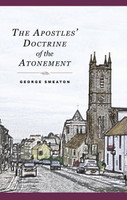
Smeaton, George
Description
‘Wherever Christianity has become a living power, the doctrine of the Holy Spirit has uniformly been regarded, equally with the atonement and justification by faith, as the article of the standing or falling church…’
— George Smeaton
The Doctrine of the Holy Spirit formed the capstone of George Smeaton’s teaching.
Handling his subject under three divisions, Smeaton treats first the testimony to the Holy Spirit as it is progressively revealed in Scripture. Secondly, he gives detailed attention to six subjects: the personality and procession of the Holy Spirit; the work of the Spirit in the anointing of Christ; the work of the Spirit in connection with revelation and inspiration; the Spirit’s regenerating work in the individual; on the Spirit of holiness; and the work of the Holy Spirit in the church. Finally, there is a historical survey of the doctrine of the Holy Spirit from the Apostolic age.
Though considered by his colleague, James Macgregor, to possess ‘the best constituted theological intellect in Christendom’, Smeaton’s lucid style and earnest spiritual convictions make him valuable to all Christian readers.
Filled with the Spirit at Pentecost, he writes, ‘the timid became bold, the selfish self-denied, the arrogant humble’, and he characterizes as ‘mischievous and misleading’ the opinion that the church, having received the Paraclete, is no longer warranted to pray for effusions of transforming power today.
Contents
Foreword by W. J. Grier
Author’s Preface
First division
The Doctrine of the Trinity—Introductory Dissertation, briefly setting forth the Biblical Testimony in the Old and New Testament
Second division
Third division
Historical Survey of the Doctrine of the Holy Spirit from the Apostolic Age
Index to Texts Elucidated
Index to Subjects and Writers
Endorsements
‘Page after page glows with the ardour of a preacher who is enamoured of his theme … The truth is so real to his own experience that he cares little for unprofitable controversies.’
— C.H. Spurgeon
‘George Smeaton was convinced that the doctrine of the Holy Spirit had been sorely neglected in his generation. He was surely right. Sadly, his indictment is true of Christians in our own times. In this book he offers a great corrective to that neglect and is thoroughly biblical, faithful, and perceptive. My favorite line in this book has always been Smeaton’s last in his first preface: ‘May the Holy Spirit, whose personality and work this treatise is intended to exhibit, condescend to accept and bless it to the glory of a Three-One God.’ This book is a great gift to the church, and belongs in every Christian’s library of classics.’
— Al Mohler
About the Author
GEORGE SMEATON (1814–1889) was born in Berwickshire in the south of Scotland, and later studied at the University of Edinburgh. He became the minister of Falkland in 1839. At the Disruption in 1843, Smeaton demitted his charge in the Established Church and later that year became the minister of the Auchterarder congregation of the Free Church of Scotland. In 1853, he took up the Chair of Divinity at the Free Church College in Aberdeen, and in 1857, was transferred to the New College in Edinburgh, where he held the position of Professor of New Testament Exegesis until his death.
Smeaton was held in high regard by his contemporaries—his colleague James Macgregor thought that Smeaton had the best-constituted theological intellect in Christendom, and Dr Alexander Stewart of Edinburgh said that he was ‘perhaps the most learned theologian in the Free Church and a man of deep and unaffected godliness.’